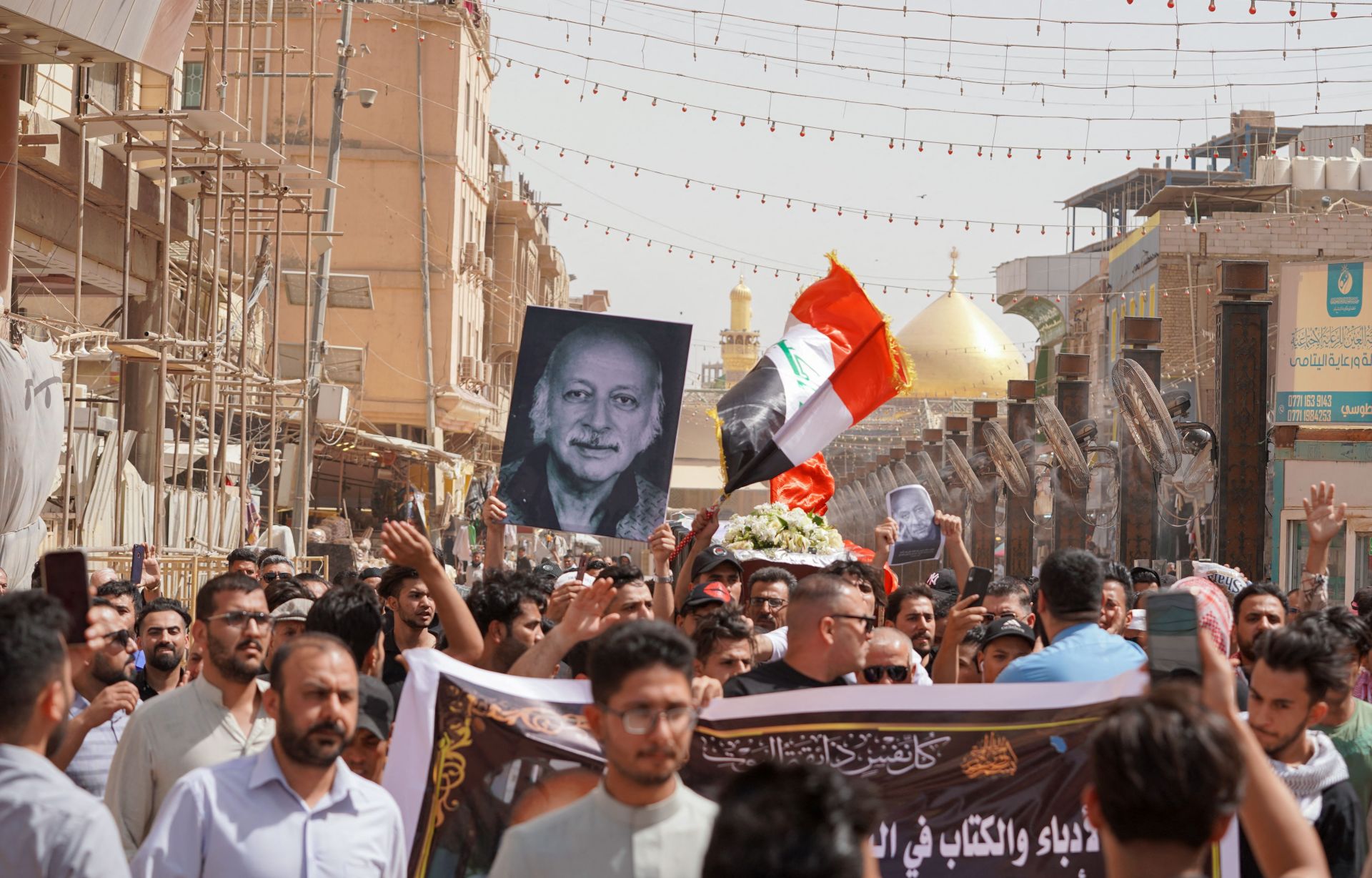DEATH OF A POET
Muzaffar Al Nuwab, Iraq’s Runaway Train
Muzaffar Al Nuwab’s legacy and pain lives on among Iraqis and Syrians

On a late-night train between Baghdad and Iraq’s south, poet Muzaffar Al Nuwab listened to a beautiful woman in her mid-forties reminiscing about a lost love from decades before. As the train neared her home village, her sorrow grew more visible. The chance encounter on the train some time in the 1960s inspired one of the most popular poems and songs in Iraq’s modern history: “The Rail” (it has the same title in Arabic: “Al Rayl”). Folklore singer Yas Khudur, known for his urban vocals, sang the words of “Al-Rayl,” which reflected a woman’s perspective:
We passed your home, oh Hamad
While on the night train
We heard coffee grinds
We smelled the cardamom
O, Train
Don’t make sounds of heartbreak and pain
Don’t make a sound of passion and fondness
I yearn for Hamad,
and I do not yearn to be for anyone else
Both poem and song captivated audiences in Iraq, the Gulf states and Syria — the same three geographical entities that chronicled the life, times and death of one of Iraq’s most celebrated poets.
Muzaffar Al Nuwab died on May 20, 2022 at the age of 88 in Sharjah, United Arab Emirates.
He had a way with words in formal Arabic and colloquial Iraqi that was relatable and expressive. In one poem, he asks an absent lover to “come to me in my dreams, I would consider it a visit.” There were, however, other forms of heartbreak he wrote about extensively. The heartbreaks shared by his generation in the Middle East: disappointment in the ruling class, riveting criticisms of authoritarianism and sorrow over Palestine. These heartbreaks established the various stations of Al Nuwab’s life.
Muzaffar Al Nuwab was born in Baghdad in 1934 to a wealthy upper-class family with Hashemite roots — descendants of the Prophet Mohammed. From an early age teachers saw his talents in arranging words and expressions and encouraged him to write on the schools’ open walls; a chalkboard for students to pin their artwork.
He earned his Bachelor of Arts degree from the University of Baghdad and was appointed as a teacher soon after. By the age of 22, despite his privileged background, Al Nuwab was ideologically left-leaning which caused his expulsion from his job in 1955, the first of many turbulent encounters with authority. Al Nuwab was reassigned to his post following the end of Iraq’s monarchy in 1958 but soon clashed with Arab nationalists after the 1963 revolution that placed Baathists in power.
He attempted to flee to the Soviet Union through Iran but was captured by Iranian intelligence and returned to Baghdad. He was sentenced to death for one of his fiery poems against authoritarianism, but later received a reduced prison sentence. Al Nuwab managed to escape prison and become a fugitive in southern Iraq where he supported himself by working for a Dutch company in Basra.
In 1969, the government, now completely under Baathist control, issued a pardon for political prisoners and fugitives. Al Nuwab emerged from hiding and was re-employed once again as a teacher. During these eventful two decades, he penned his most famous political poem following the defeat of Arab countries in 1967. In his poem, he describes Arab leaders as “sons of whores.” The poem and its use of profanity gained Al Nuwab a cult following among disappointed youth in the region, particularly Iraq and Syria. He fled Iraq once again soon after, making Syria his second home. Although also Baathist, the regime in Damascus was more tolerable to Al Nuwab, though that didn’t stop his criticism. He continued scorning Arab leaders in poems, including Hafez Al Assad who miraculously overlooked it.
In 2003, Al Nuwab supported the removal of Saddam Hussein from power. Although he was an anti-imperialist leftist, he accepted that an occupying American force was the means to remove a dictator. He did not necessarily endorse the occupation. In fact, in the years that followed, Al Nuwab’s poems about Iraq grew more painful, reflecting a deeper sorrow: disillusionment and complete desperation. Al Nuwab no longer believed that he would see his homeland prosper in his lifetime. He visited Iraq again, but by then he was too frail and too sick to live in Baghdad.
He settled in the United Arab Emirates, an ironic destination: He wrote some of his harshest poems against the monarchs and sheikhdoms, yet found a home during his hospice years in one of them until his death. Muzaffar Al Nuwab was 88 years old. He had been in and out of prison and on the run throughout his youth. He illustrated his agony through his words from the diaspora for decades while becoming one of the most admired figures in the art of spoken, written and sung words for generations of Iraqis. He was simply exhausted.
Muzaffar Al Nuwab was taken to his last destination, back home to Baghdad, for his final rest. His funeral procession was akin to a majestic homecoming ceremony where his life was celebrated by legions of admirers despite never having met their idol during their lifetime. Many politicians attended the funeral such as the infamous former PM Nouri Al Maliki. In true Al Nuwab fashion, Al Maliki was ejected from the procession by young Iraqis, his name cursed and his presence unwelcome. If anything could patch Muzaffar Al Nuwab’s broken heart, it is knowing that his legacy, passion and pain carry on, and were on full display as he was laid to rest.
No comments:
Post a Comment